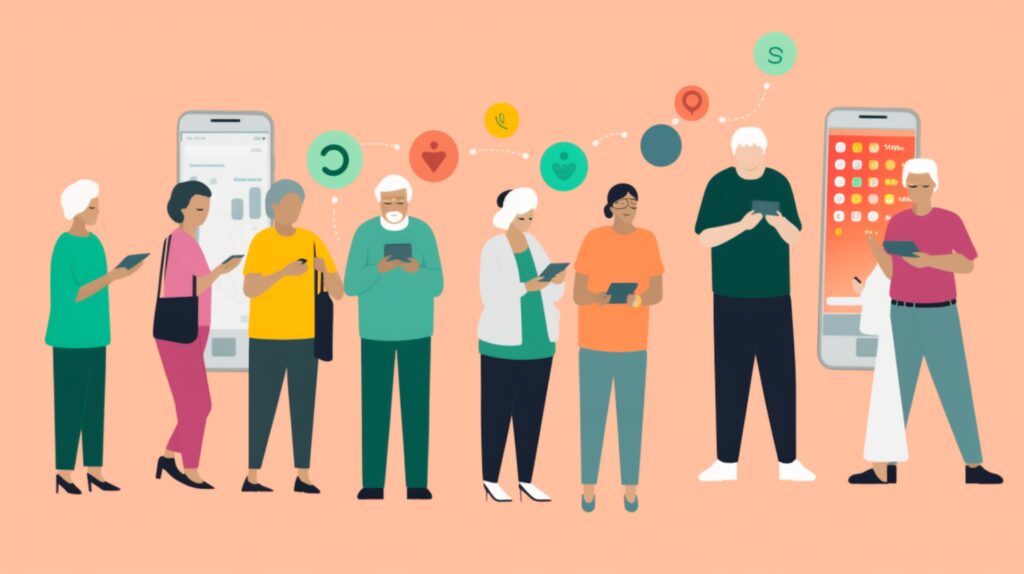In a world increasingly dominated by digital platforms and services, the concept of one’s identity has significantly evolved. Beyond our physical existence, our digital identity now plays a crucial role in how we interact, engage, and make decisions. This transformation has affected everyone, including older adults. Today, more than ever, seniors need to understand the importance of digital identity and online privacy.
The once straightforward task of identity verification has become a complex digital challenge. Also, with the rise of social media and other digital platforms, managing one’s online reputation has never been more crucial. Furthermore, data privacy issues are constantly at the forefront of digital interactions, with news of data breaches, identity theft, and privacy violations becoming all too common.
This article explores how older adults can empower themselves by understanding and managing their digital identities, safeguarding their online reputations, and ensuring data privacy. The focus is on creating an enabling environment where older adults can navigate the digital world with confidence, safeguarding their privacy and shaping their online image.
The Importance of Digital Identity and Data Privacy for Older Adults

In the digital realm, our identity is a unique representation of ourselves that encompasses all our online actions and interactions. This identity, once established, can impact everything from our social interactions to our financial transactions. For older adults, this becomes especially important as they engage more with online platforms for healthcare, banking, shopping, or social connections.
Data privacy, on the other hand, is a fundamental right. Yet, it is often compromised, especially online. For older adults, the threats are greater due to their lack of familiarity with digital technology and cyber threats. They could unknowingly share sensitive information, making them vulnerable to identity theft, scams, or privacy violations.
Therefore, understanding the importance of a secure digital identity and robust data privacy practices can help older adults safeguard themselves against these potential threats. In an age where one’s online persona can affect offline reality, the need for digital literacy among older adults is critical.
Overview of Digital Identity Verification, Online Reputation Management, and Data Privacy
Digital Identity Verification is the process of confirming the authenticity of an individual’s digital persona. This often involves multiple steps, such as verifying email addresses, phone numbers, or using biometric data. Older adults can use this process to prove their identities online, safeguarding themselves against fraud or identity theft.
Online Reputation Management involves shaping and influencing an individual’s or group’s reputation on the internet. For older adults, managing their online image becomes crucial as they increasingly use social media, forums, and other platforms. They can ensure that the content they share, their online interactions, and digital footprints align with their real-world persona and values.
Data Privacy refers to the practices and measures taken to protect personal information from being accessed, used, or shared without consent. In an age where personal data has become a valuable commodity, older adults need to understand how their data is collected, used, and shared.
Learning about privacy settings, data encryption, and secure communication can help them maintain control over their personal information. Through understanding and managing these aspects, older adults can empower themselves in the digital world, reinforcing their sense of identity, privacy, and security.
Digital Identity Verification for Older Adults
As the internet becomes an indispensable part of our lives, particularly for older adults, this verification process is increasingly significant. It enables them to validate their identity securely, enabling access to essential services and protecting them from cyber threats. This section delves into the importance of secure digital identities and the various methods for digital identity verification.
Importance of Secure Digital Identities
Securing one’s digital identity is not just about protection; it’s about empowerment. It provides a solid defense against online fraud and scams. Simultaneously, it allows older adults to access services and benefits without worrying about identity theft. Secure digital identities can act as a gatekeeper, preserving online safety while facilitating easier access to digital resources. Let’s explore these points further in the next sections.
1. Online Safety and Fraud Prevention
Fraudsters often target older adults due to their perceived vulnerability online. However, a secure digital identity can act as a shield against online scams and fraud. By confirming the authenticity of their online presence, older adults can better defend themselves against identity theft, phishing scams, and other forms of cybercrime.
They can safely engage in online transactions, share information, and navigate the digital space without fear. Through secure digital identities, older adults can gain the confidence to explore and benefit from the digital world, knowing their personal information is safe.
2. Facilitating Access to Services and Benefits
Digital identities play a significant role in facilitating access to various services and benefits online. From healthcare services and financial transactions to social networking and e-commerce, a verified digital identity is often a prerequisite.
For older adults, having a secure digital identity ensures that they can seamlessly avail of these services, regardless of their physical location or mobility. Moreover, it can assist them in claiming benefits exclusive to their age group, like senior citizen discounts and pension claims, in an online setting.
Methods of Digital Identity Verification
The sophistication of digital identity verification methods has grown significantly, offering various ways to confirm one’s online persona securely. From government-issued digital IDs to biometrics and multi-factor authentication, these methods provide a robust safeguard for older adults navigating the digital landscape. As we dive into these methods, we will discover how they empower older adults to engage confidently in online interactions, providing a greater level of security and assurance.
1. Government-Issued Digital IDs
Many countries are adopting government-issued digital IDs, which serve as a robust and reliable means of digital identity verification. For older adults, these digital IDs can be a secure way to verify their identities online.
They can use these IDs for a range of services, from healthcare and social security benefits to banking and legal services. While the availability and specifics of these IDs differ from country to country, their common goal is to provide a credible and secure means of verifying digital identities.
2. Biometrics and Multi-factor Authentication
Biometric data and multi-factor authentication have become standard practices in digital identity verification. Biometrics, such as fingerprints, iris scans, or voice recognition, provide a unique and secure way of verifying identities. Multi-factor authentication, on the other hand, involves providing two or more pieces of evidence to authenticate a user’s identity.
For older adults, these methods offer an additional layer of security, ensuring their digital identities are well-protected. By embracing these techniques, they can reinforce their online safety and enjoy a seamless digital experience.
Online Reputation Management for Seniors

As seniors become more active online, managing their digital footprint and the perception of their online personas becomes increasingly important. This section discusses the significance of protecting personal and professional reputations online and offers insights into effective tools and techniques that seniors can use to manage their online reputations.
Protecting Personal and Professional Reputations
Maintaining a positive online reputation can protect seniors’ personal and professional interests. As digital communication becomes more prevalent, their online presence can have significant real-world implications. This discussion will focus on two essential aspects: monitoring social media and search results, and effectively dealing with negative information and online harassment.
1. Monitoring Social Media and Search Results
Social media platforms and search engines play a considerable role in shaping online reputations. For seniors, regularly monitoring what appears about them online can be a proactive way to manage their digital image. This includes reviewing posts on social media, checking search engine results, and keeping an eye on online discussions involving them.
A negative comment or an inappropriate post can tarnish their online reputation. Therefore, being aware of how they’re represented online and taking corrective actions when necessary can help seniors maintain a positive online persona.
2. Dealing with Negative Information and Online Harassment
Negative information or online harassment can severely damage an individual’s online reputation. For seniors, it’s essential to know how to respond to these situations effectively. They should learn how to report inappropriate content on various platforms, request removal of false or damaging information, and protect themselves from online harassment.
If they encounter a false narrative or abusive content, they should seek help from family members, friends, or even legal professionals. Staying educated about their rights and protections online can help seniors deal with such incidents, ensuring their online reputation remains intact.
Tools and Techniques for Reputation Management
There are several tools and techniques available to assist with online reputation management. Leveraging these resources can help seniors actively shape their online personas, respond effectively to negative feedback, and foster a positive online presence. The following discussion explores two such techniques: using search engine optimization (SEO) and engaging positively with online communities.
1. Using Search Engine Optimization (SEO)
Search Engine Optimization (SEO) involves using strategies to make online content more discoverable by search engines. Seniors can use SEO techniques to control what appears in search results associated with their names. This could involve creating and sharing positive content about themselves, such as personal blogs, participating in forums, or maintaining active profiles on social media.
By optimizing this content with relevant keywords, they can enhance its visibility, ensuring that positive and accurate information appears in search results when someone looks up their name.
2. Engaging with Online Communities and Building a Positive Presence
Engaging with online communities can be an effective way for seniors to build a positive online reputation. Participating in discussions, sharing insights, and providing support to others can all contribute to a favorable online image. Actively engaging with these communities allows seniors to leave a positive digital footprint.
Over time, these positive interactions accumulate, building a robust and positive online reputation. In turn, this can impact everything from personal relationships to professional opportunities. It’s also an excellent way for seniors to connect with like-minded individuals, contributing to a sense of community and belonging in the digital world.
Data Privacy and Security for Older Adults

As seniors engage more with online platforms and services, understanding and practicing good data privacy and security measures can significantly enhance their digital safety. This segment addresses common privacy concerns and risks for older adults and suggests best practices for safeguarding personal information online.
Common Privacy Concerns and Risks
Seniors, like any internet users, face various privacy concerns and risks online. From identity theft to unauthorized data collection, it’s essential to be aware of these risks to mitigate them effectively. In the following discussion, we will delve into two significant online risks for older adults: identity theft and financial scams, and unauthorized data collection and sharing.
1. Identity Theft and Financial Scams
One major risk for seniors online is identity theft and financial scams. Fraudsters often prey on older adults, exploiting their potential lack of technical expertise or understanding of digital security. Phishing emails, fraudulent websites, and scams disguised as legitimate services can all lead to identity theft or financial loss.
Seniors must be aware of these risks and know how to identify potential threats. Vigilance, skepticism towards too-good-to-be-true offers, and verification of the legitimacy of services and emails are some ways to prevent falling victim to such scams.
2. Unauthorized Data Collection and Sharing
Another concern is unauthorized data collection and sharing. Many digital platforms collect user data, sometimes without explicit consent or knowledge. This data can be shared with third parties, potentially leading to privacy violations.
Seniors must understand how their data is used and shared, and where possible, customize privacy settings to limit data sharing. Reading privacy policies, even though they might be lengthy and technical, can provide valuable insights into a platform’s data practices. This awareness can help seniors take control of their personal information online.
Best Practices for Safeguarding Personal Information
Awareness of privacy risks is the first step; the next is to implement best practices to protect personal information online. By developing good digital habits, seniors can greatly improve their online privacy and security. The ensuing section explores two fundamental aspects of personal information protection.
1. Strong Passwords and Secure Connections
Using strong, unique passwords for each online account is a simple yet effective security practice. Password managers can assist in generating and storing these passwords securely. Also, whenever available, seniors should enable two-factor authentication for added security. Another crucial aspect is using secure connections.
When using public Wi-Fi, for instance, it’s advisable to use a virtual private network (VPN) to encrypt data and keep it secure from potential eavesdroppers. These practices can greatly enhance online security, protecting personal information from unauthorized access.
2. Being Selective with Sharing Personal Data
Being selective with personal data shared online can significantly reduce privacy risks. Before sharing information, seniors should consider its necessity and potential uses. For example, does a shopping site need to know your date of birth? If it’s not required for the service, it’s best not to share it.
Seniors should also be aware of the information they share publicly on social media, as this can be used by scammers or identity thieves. Implementing a policy of ‘minimum information sharing’ can be an effective strategy for seniors to enhance their online privacy, ensuring they share only what’s necessary and keep the rest private.
Real-life Examples, Case Studies, and Anecdotes
Real-life examples, case studies, and personal stories can provide invaluable insights into the reality of digital identity, online reputation, and data privacy issues faced by older adults. They offer tangible evidence of these concepts in action and illuminate the ways seniors have navigated these challenges successfully.
The following sections present examples and stories of older adults who have regained control of their digital identity succeeded in managing their online reputation, and overcome data privacy challenges.
1. Older Adults Who Regained Control of Their Digital Identity
Stories of seniors reclaiming their digital identity can be powerful lessons for others facing similar situations. They exemplify resilience and resourcefulness in the face of digital adversity. They illustrate how understanding the importance of digital identity verification and taking appropriate measures can help seniors secure their online presence and gain the confidence to engage more fully in the digital world.
2. Success Stories in Online Reputation Management
Success in online reputation management is not exclusive to the tech-savvy youth. There are inspiring stories of older adults who have successfully maintained a positive online presence. Some seniors have leveraged their digital platforms to share their life experiences, knowledge, or even entrepreneurial ventures, creating a favorable online image.
Others have effectively dealt with negative online content, transforming their online reputation positively. These success stories showcase how seniors, by taking control of their digital narratives and engaging meaningfully online, can build a positive online reputation, reaping personal and professional benefits.
Data Privacy Challenges Faced by Seniors and Their Solutions
The journey towards data privacy and security is often marked by challenges. Numerous seniors have faced data breaches, identity thefts, or privacy violations, only to come out stronger and more knowledgeable. Their stories serve as important lessons in vigilance and best practices for digital safety.
Some seniors have even become advocates for online safety in their communities, using their experiences to educate others. These anecdotes underscore the fact that while data privacy challenges can be daunting, they are not insurmountable. With the right knowledge and tools, seniors can protect their personal information and enjoy a safe online experience.
Conclusion
In the digital age, the importance of understanding and managing digital identity, online reputation, and data privacy cannot be overstated, particularly for older adults. The intersection of these concepts poses both opportunities and challenges, shaping seniors’ digital experiences and their engagement with online services and platforms.
Digital identity verification is essential in ensuring online safety and facilitating access to services and benefits. Through secure digital identities, whether via government-issued digital IDs or biometrics, older adults can protect themselves against fraud while conveniently accessing various online services.
Online reputation management is a key aspect of seniors’ digital presence. With a positive online reputation, seniors can protect their personal and professional interests, while also enhancing their online experiences. Utilizing tools and techniques such as SEO and engaging positively with online communities can play a crucial role in shaping a favorable online persona.
Data privacy and security are crucial for preserving personal information and maintaining trust in digital platforms. By understanding common privacy concerns, like identity theft and unauthorized data collection, and adopting best practices like using strong passwords and being selective with personal data sharing, seniors can mitigate privacy risks.
Real-life examples and success stories underline the significance of these concepts. They demonstrate how older adults have effectively navigated these digital challenges, underscoring the importance of digital literacy and resilience.
FAQ
What is Digital Identity Verification and Why is it Important for Seniors?
Digital identity verification is the process of confirming a person’s identity online. It is critical for seniors to ensure safe access to online services and prevent fraudulent activities. Verification can be via government-issued digital IDs or biometrics. With secure digital identities, seniors can protect themselves from identity theft, scams, and fraud, all of which are prevalent in the digital space.
How Can Older Adults Manage their Online Reputation Effectively?
Managing online reputation involves monitoring and influencing how one is perceived online. Seniors can do this by being mindful of what they share online, engaging positively in digital communities, and regularly checking their online presence through search engine results. Using tools for reputation management like SEO can also enhance their visibility online.
What are Some Essential Data Privacy Practices for Seniors?
Key data privacy practices for seniors include using strong, unique passwords for each online account, enabling multi-factor authentication, and maintaining secure connections, especially when using public Wi-Fi. Seniors should also be selective with what personal data they share online, reading privacy policies and customizing privacy settings to limit data sharing.
References
- https://www.biometricsinstitute.org/
- https://www.mirrorreview.com/
- https://www.gov.uk/
- https://www.europarl.europa.eu/
